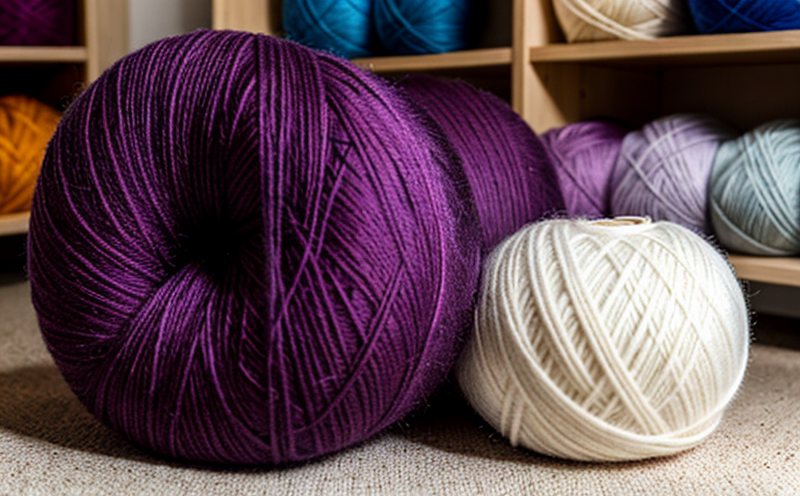JIS L1095 Testing Methods for Yarn Twist
The JIS L1095 test methods are specifically designed to assess the twist of yarns. This testing is essential in quality assurance and control, ensuring that yarn products meet the required specifications. The JIS standard has been widely recognized for its accuracy and reliability across various industries, including textiles.
The twist in yarn can affect multiple aspects of textile performance, such as fabric strength, drape, and comfort. Proper measurement of twist ensures consistency in product quality, which is critical for maintaining brand reputation and customer satisfaction. The test involves measuring the rotation rate or angle of yarns under specified conditions to determine their twist characteristics.
The methodology typically includes a series of steps designed to standardize the testing process. First, the specimen preparation must be consistent with predefined guidelines in JIS L1095. This ensures that all samples tested are comparable and fair for evaluation. The test can then proceed using a twist tester or similar apparatus.
The equipment used for this test is crucial as it directly impacts the accuracy of measurements. Commonly, specialized instruments like automatic yarn twist testers are employed to automate the process. These devices measure twist by calculating the number of rotations per unit length over a defined distance. Proper setup and calibration are essential to ensure accurate results.
The acceptance criteria for JIS L1095 vary depending on the type of yarn being tested. For instance, natural fibers like cotton or synthetic blends may have different acceptable ranges compared to silk or wool. Compliance with these standards is vital as non-compliance could lead to product defects and potential market rejection.
The importance of this testing extends beyond just quality assurance within individual companies; it also plays a role in international trade by ensuring consistency among suppliers. By adhering to JIS L1095, manufacturers can demonstrate that their products meet global standards, enhancing trust and credibility with buyers worldwide.
In summary, the JIS L1095 testing methods are indispensable tools for textile producers aiming to maintain high-quality standards in yarn manufacturing. Understanding these tests helps quality managers and compliance officers make informed decisions about product development and supplier selection. For R&D engineers working on new fiber blends or fabric innovations, mastering this technique ensures that they can accurately measure the twist characteristics of their creations.
Why It Matters
The measurement of yarn twist plays a pivotal role in textile manufacturing processes because it influences several key properties of fabrics. A balanced twist contributes significantly to fabric strength, which is crucial for durability and longevity. Additionally, appropriate twist levels enhance the drape of garments—how they hang when worn—which affects both aesthetics and fit.
From an economic perspective, consistent yarn twist can minimize waste during production by reducing rejections due to quality issues. This not only saves time but also reduces costs associated with scrap disposal or reprocessing. In competitive markets where cost efficiency is vital, maintaining optimal yarn twist becomes a strategic advantage.
In terms of consumer satisfaction, textiles that meet specific twist requirements often perform better in real-world applications. For example, fabrics with the right amount of twist tend to be more comfortable and wrinkle-resistant, leading to higher customer approval rates. This aligns closely with sustainability goals as well, as fabric longevity translates into reduced resource consumption over time.
For businesses operating internationally, compliance with international standards like JIS L1095 is increasingly necessary. It opens doors to export markets where these specifications are mandatory. Meeting such requirements boosts market access and fosters stronger relationships between domestic suppliers and overseas customers.
Competitive Advantage and Market Impact
Adopting JIS L1095 testing methods offers textile manufacturers several competitive advantages that can significantly impact their market position. One key benefit is improved product quality, which translates into better customer satisfaction and loyalty. Consistently meeting international standards enhances brand reputation, making it easier to attract new clients and retain existing ones.
Another advantage lies in enhanced operational efficiency. By using standardized testing procedures, companies can streamline their production processes, leading to reduced downtime and increased output rates. This is particularly important given the fast-paced nature of modern manufacturing environments where flexibility and speed are critical factors.
The ability to produce high-quality yarns also attracts premium pricing opportunities, allowing businesses to charge more for their products. Higher prices translate into greater profitability, which can be reinvested into further innovation or expanded operations.
Furthermore, adherence to international standards like JIS L1095 demonstrates a commitment to excellence and reliability, appealing strongly to environmentally conscious consumers who value sustainable practices. This alignment with green initiatives helps companies position themselves favorably in the growing market for eco-friendly products.
Use Cases and Application Examples
- Fabric Mills: Ensuring uniformity across batches of yarn, which is crucial for consistent fabric quality.
- Retailers: Guaranteeing the authenticity and consistency of imported fabrics by verifying twist measurements against JIS standards.
- OEMs and Contract Manufacturers: Meeting specific client requirements that demand strict adherence to international standards.
- Research Institutions: Developing new textile materials where precise control over yarn characteristics is necessary for achieving desired performance attributes.
In addition, these tests are used in quality assurance programs to identify any deviations from expected standards early on. Early detection allows corrective actions to be taken promptly, preventing costly errors further down the line. Additionally, they serve as valuable tools during troubleshooting processes when unexpected issues arise.





